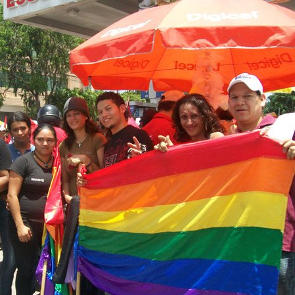LGBTI defenders in Honduras: doubly at risk
In the evening of 24 January 2016, Paola Barraza's heard voices outside her home calling to her. When she opened the door, a group of men shot her five times. She died shortly after as a result of her wounds.
Paola Barraza is a trans woman and member of Arcoíris, an organisation which works for the lesbian, gay, trans, bisexual and intersex (LGTBI) community in Honduras. This was not the first time Paola was attacked; in August 2015 unknown men had already tried to kill her. She was shot numerous times and she was seriously injured as a result of the attack.
In the past eight months, six members of Arcoíris were killed in Honduras. As reported by PBI Honduras, the association's members have suffered 12 physical attacks from July 2015 to January 2016. Some of its staff have had to leave the country because of the threats they were receiving.
The attacks against Arcoíris reflect a growing number of targeted killings against LGBTI defenders in the country. “Everywhere we go we are despised and discriminated against,” said LGBT human rights defender Nahomy Otero to the Irish Times. “(We suffer) harassment, threats, hate attacks, rape, brutal beatings and other form of torture, many of which have been committed by police officers and other public security agents.”
The work of human rights defenders in Honduras is critical. They investigate, report on, publicise, and seek justice for the violations against their communities that may otherwise go unreported and unpunished, and in doing so they remind both the perpetrators and the victims that impunity must not continue. HRDs working for the rights of the LGBTI community face extreme obstacles, as extreme violence persists against LGBTI individuals in Honduras.
According to José Zambrano, an Honduran human rights defender, more than 200 members of the LGBTI community were killed in the country between 2008 and 2015. Among these, many were LGBTI defenders, who are doubly discriminated against: both their sexuality and their defense of human rights puts them at risk of attack.
On 18 September 2015, poet and LGBTI rights defender Ms Gloria Carolina Hernández Vásquez, also known as Génesis Hernández, was kidnapped and brought to the outskirts of Tegucigalpa, where she was killed. Witnesses say her killers verbally abused her regarding her sexual orientation and then shot her twice in the head.
In her poetry, Génesis was writing about the sexual rights of women, including lesbians and bisexual women, as a way of giving visibility to these issues. She had also taken part in many marches for LGBTI rights and she had been forced to leave her house and relocate because of the threats she was receiving.
On 6 September 2015, just two weeks before Génesis' assassination, Mr Jorge Alberto Castillo was killed. He was stoned to death near his home in El Manchén, Tegucigalpa. Both Jorge and Génesis were working with the Asociación por una Vida Mejor - APUVIMEH (Association for a Better Life), that works with the lesbian, gay, bisexual, transgender and intersex community and those affected by HIV/AIDS in Honduras. Jorge was a founding member of the Casa Renacer, a shelter for people with HIV/AIDS, and he was one of the first people to begin claiming LGBTI rights in Honduras.
In the summer of 2015, LGBTI rights defenders Angy Ferreira, Juan Carlos Cruz Andara and Violeta Rivas were also killed.
These killings follow a pattern of intimidation against members of the LGBTI community in Honduras. On 11 October 2015, Mr Francisco Mencia, human rights lawyer and legal advisor for APUVIMEH, was attacked close to his home in Tegucigalpa and left for dead. In the summer of 2015, the director of APUVIMEH Ms Sandra Zambrano and other staff of the organisation were intimidated by the police. Security officers brought them to a police station, where they were forced to write down that they were drunk in public, despite the fact that none of the group had been drinking. The group was held for a full day. They were not permitted to make a phone call, or given access to food or water, nor were they read their rights or informed of the reasons for their detention.
“These security incidents demonstrate the endemic violence facing Honduran LGBT organisations, which seriously affects their work and reduces the space necessary for the defence of human rights”, says PBI Honduras.
Front Line Defenders strongly condemns the killings of LGBTI human rights defenders in Honduras, and expresses its deep concern at the climate of extreme violence that LGBTI organisations are facing.
Update: on 18 February 2016, the EU delegation in Honduras published a statement condemning the killings of LGBTI defenders in the country: "We want to reiterate our sadness and our concern regarding the alarming news about new attacks.(...) It is necessary to investigate these cases and have a rigorous judicial process, so they don't remain in impunity".

